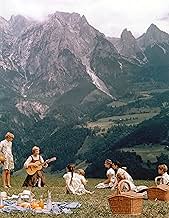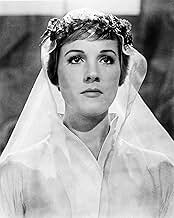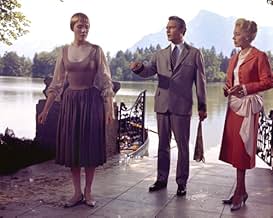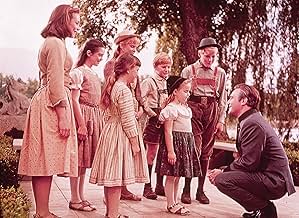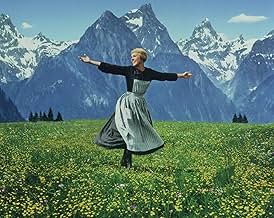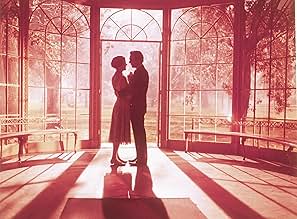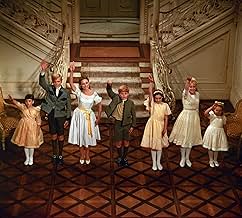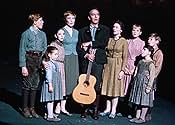Una donna lascia un convento austriaco per diventare la governante dei bambini di un vedovo ufficiale della marina.Una donna lascia un convento austriaco per diventare la governante dei bambini di un vedovo ufficiale della marina.Una donna lascia un convento austriaco per diventare la governante dei bambini di un vedovo ufficiale della marina.
- Regia
- Sceneggiatura
- Star
- Vincitore di 5 Oscar
- 19 vittorie e 13 candidature totali
Heather Menzies-Urich
- Louisa von Trapp
- (as Heather Menzies)
Gilchrist Stuart
- Franz
- (as Gil Stuart)
Riepilogo
Reviewers say 'The Sound of Music' is cherished for its iconic songs, enchanting performances, and stunning visuals. Themes of love, family, and freedom resonate deeply, though the film's portrayal of Nazism is criticized. Julie Andrews and Christopher Plummer deliver standout performances, while the cinematography is lauded. However, some find the sentimentality, pacing, and character depth lacking. Despite these critiques, its cultural impact and emotional resonance endure.
Recensioni in evidenza
1965's "The Sound of Music" is everything a bad musical should be. Providing more sap than a forest full of Vermont maples, it has coy, silly songs, an inane, innocuous script, and unbelievably sugary characters. So why is it one of my favorite musicals? OK, go ahead. Shoot me at twenty paces. But after all this time, it still remains a guilty pleasure. I find myself going for a tub of rocky road ice cream and Rodgers & Hammerstein's immortal classic whenever the real world gets to be too much. I seem to play it a lot around tax time.
And I'm not alone. Why is it still considered the most popular musical of all time? Well, first of all they spared no expense. The extremely well-produced blockbuster has gorgeous, eye-popping scenery. From the first moment Julie Andrews flails her arms and circles around on that beautiful sunny hillside singing the rousing title song, I know I'm being swept away to another world. I'm not in Kansas anymore...or L.A., anyway. The panoramic Salzburg background complements and never intimidates or takes away from the characters or their story (like the other R & H extravaganza "South Pacific.") That in itself is an incredible feat.
Now about those songs. Almost every one of them is absolute drivel. So what makes them work? Easy. The utter joy and sincerity of the cast who sings the infectious, hummable tunes, which are backed by extremely moving orchestrations and an exceptionally beautiful score. It's hard to resist Maria prancing about, pillow-fighting with a bunch of knee-highs and gushing about her most favorite things. Or the austere Captain Von Trapp (the meticulous Christopher Plummer) turning to butter after hearing his brood sing in perfect harmony for the first time (with no prior lessons even) and joining right in. Or the Mother Superior's soaring number that unknowingly forewarns Maria to head for the hills (I mean, mountains) before the Nazis escort them elsewhere. Or the 16-year-old going on 17 squealing with delight after receiving her first kiss. Or the kids working up a clever little ditty to leave their formal party guests when its time for bed. Or two people declaring their love in a moonlit gazebo. The songs work because they come straight from and aim for the heart, not the head, which is exactly the place the viewer should be coming from when watching this movie. If the songs don't transcend the script (which they didn't prior to the 70s), they certainly transcend the mood.
The script is undeniably trite and probably the film's weakest link. But again, the characters play it straight all the way. Not one actor looks embarrassed. Every scene is done with total enthusiasm and total commitment, and the performers who are telling the story are pitch-perfect and picture perfect.
And as for the characters. Try and think of anybody better than jubilant, crop-haired Julie Andrews as a postulant nun who has gorgeous pipes, can make play clothes out of curtains, can set up and operate marionette shows at the drop of a hat, and is confident enough to convince a man that a failed nun is ideal marriage material. I certainly can't. Thank heavens for her Oscar-winning "Mary Poppins" the year before or we might have gotten Julie LONDON instead! After all, Andrews did lose out on "My Fair Lady" the year before. But now certifiably bankable, she proved she could handle this dream role. Andrews is cutely silly, cutely stubborn, cutely astute, cutely shattered and cutely...well, cute. She gives the most wholesomely appealing musical perf since Judy Garland in "The Wizard of Oz." To actually make you forget Mary Martin in the Broadway role takes some doing and she does it effortlessly. Christopher Plummer is all seriousness, handsomely patrician, and quite a catch for anybody...much less a nun. I can't think of anyone more suitable for this role either. As for the Seven Little Foys, I mean the Von Trapp children, they are adorable and perfect in their own ways too, whether they are marching or singing, creating their own individual personalities by film's end.
Richard Haydn as Max and Eleanor Parker as the flamboyant, haughty Baroness provide wonderful catty relief. Despite having their musical numbers snatched away from them, they make up for it with droll, sophisticated humor. The elegant, perfectly coiffed Parker is particularly delicious as Maria's chief romantic rival, getting some of the film's best zingers and delivering them with biting understatement. Parker developed a devout cult following after this role. Peggy Wood's Mother Superior is suitably reverent and inspiring.
For those who tear "The Sound of Music" apart for its shameless, sugar-coated manipulations, well, I can respect that. But to attack it for its political and historical inaccuracies is like attacking "Peter Pan" for being a subversive plot that encourages young children to run away from home. It's ludicrous. Despite the fact that it's based on a true story, we're not watching "The Sound of Music" for stark realism. Like a sparkling and lavish Ernst Lubitsch operetta, we want a feel-good movie, with feel-good songs, with a feel-good story, and a feel-good ending. Nothing more. If you want a movie that presents a potent depiction of pre-war Austria or anti-Nazi sentiment, rent "Holocaust" or "Schindler's List." Here, we want to believe that a group of nuns can tear out an automobile carburetor and save the world! Period.
I suppose the reality-based MTV generation cannot truly respect or relate to the relative innocence and pure escapism like "The Sound of Music." If this movie was made today I'm afraid the Von Trapp children would not be dangling out of trees for fear of drive-by shooters. It's a tough new world today, sad to say. The 50s and 60s are looking better all the time.
Anyway, for what it's worth, "The Sound of Music" is indeed schmaltz, but its QUALITY schmaltz at its very, very best.
And I'm not alone. Why is it still considered the most popular musical of all time? Well, first of all they spared no expense. The extremely well-produced blockbuster has gorgeous, eye-popping scenery. From the first moment Julie Andrews flails her arms and circles around on that beautiful sunny hillside singing the rousing title song, I know I'm being swept away to another world. I'm not in Kansas anymore...or L.A., anyway. The panoramic Salzburg background complements and never intimidates or takes away from the characters or their story (like the other R & H extravaganza "South Pacific.") That in itself is an incredible feat.
Now about those songs. Almost every one of them is absolute drivel. So what makes them work? Easy. The utter joy and sincerity of the cast who sings the infectious, hummable tunes, which are backed by extremely moving orchestrations and an exceptionally beautiful score. It's hard to resist Maria prancing about, pillow-fighting with a bunch of knee-highs and gushing about her most favorite things. Or the austere Captain Von Trapp (the meticulous Christopher Plummer) turning to butter after hearing his brood sing in perfect harmony for the first time (with no prior lessons even) and joining right in. Or the Mother Superior's soaring number that unknowingly forewarns Maria to head for the hills (I mean, mountains) before the Nazis escort them elsewhere. Or the 16-year-old going on 17 squealing with delight after receiving her first kiss. Or the kids working up a clever little ditty to leave their formal party guests when its time for bed. Or two people declaring their love in a moonlit gazebo. The songs work because they come straight from and aim for the heart, not the head, which is exactly the place the viewer should be coming from when watching this movie. If the songs don't transcend the script (which they didn't prior to the 70s), they certainly transcend the mood.
The script is undeniably trite and probably the film's weakest link. But again, the characters play it straight all the way. Not one actor looks embarrassed. Every scene is done with total enthusiasm and total commitment, and the performers who are telling the story are pitch-perfect and picture perfect.
And as for the characters. Try and think of anybody better than jubilant, crop-haired Julie Andrews as a postulant nun who has gorgeous pipes, can make play clothes out of curtains, can set up and operate marionette shows at the drop of a hat, and is confident enough to convince a man that a failed nun is ideal marriage material. I certainly can't. Thank heavens for her Oscar-winning "Mary Poppins" the year before or we might have gotten Julie LONDON instead! After all, Andrews did lose out on "My Fair Lady" the year before. But now certifiably bankable, she proved she could handle this dream role. Andrews is cutely silly, cutely stubborn, cutely astute, cutely shattered and cutely...well, cute. She gives the most wholesomely appealing musical perf since Judy Garland in "The Wizard of Oz." To actually make you forget Mary Martin in the Broadway role takes some doing and she does it effortlessly. Christopher Plummer is all seriousness, handsomely patrician, and quite a catch for anybody...much less a nun. I can't think of anyone more suitable for this role either. As for the Seven Little Foys, I mean the Von Trapp children, they are adorable and perfect in their own ways too, whether they are marching or singing, creating their own individual personalities by film's end.
Richard Haydn as Max and Eleanor Parker as the flamboyant, haughty Baroness provide wonderful catty relief. Despite having their musical numbers snatched away from them, they make up for it with droll, sophisticated humor. The elegant, perfectly coiffed Parker is particularly delicious as Maria's chief romantic rival, getting some of the film's best zingers and delivering them with biting understatement. Parker developed a devout cult following after this role. Peggy Wood's Mother Superior is suitably reverent and inspiring.
For those who tear "The Sound of Music" apart for its shameless, sugar-coated manipulations, well, I can respect that. But to attack it for its political and historical inaccuracies is like attacking "Peter Pan" for being a subversive plot that encourages young children to run away from home. It's ludicrous. Despite the fact that it's based on a true story, we're not watching "The Sound of Music" for stark realism. Like a sparkling and lavish Ernst Lubitsch operetta, we want a feel-good movie, with feel-good songs, with a feel-good story, and a feel-good ending. Nothing more. If you want a movie that presents a potent depiction of pre-war Austria or anti-Nazi sentiment, rent "Holocaust" or "Schindler's List." Here, we want to believe that a group of nuns can tear out an automobile carburetor and save the world! Period.
I suppose the reality-based MTV generation cannot truly respect or relate to the relative innocence and pure escapism like "The Sound of Music." If this movie was made today I'm afraid the Von Trapp children would not be dangling out of trees for fear of drive-by shooters. It's a tough new world today, sad to say. The 50s and 60s are looking better all the time.
Anyway, for what it's worth, "The Sound of Music" is indeed schmaltz, but its QUALITY schmaltz at its very, very best.
"The Sound of Music" is an impressive musical that stands above other films of the genre because of interesting characters, top-notch direction, and a truly inspired screenplay. Julie Andrews (Oscar-nominated) stars as the young nun who leaves the convent to become the governess to a large family. She is instantly at odds with the children's father (Christopher Plummer), but they soon fall in love and get married. However, evil forces lurk overhead as the Nazis invade their homeland of Austria. Somewhat based on a true story, "The Sound of Music" is one of those rare musicals that works because there is a sense of fear and drama in the film's final act. This makes the film believable and none of the musical numbers take away from the story or the film's direction. 5 stars out of 5.
The "Sound of Music" is set in the mountainous hills and the city of Salzburg, Austria. There is to my eye at least, something about its spacious alpine countryside which dominates and informs the entire production. The air, the light, the music, the styles of dress, the activities--everything is "elevated", with hardly anything being sea-level about it. And the film has a very good "engagement sequence" at the opening, when we learn about the central ethical character and experience her leaving the abbey where she has served along with her, and begin to care about her purposes. The story-line is simple and relatively direct: A young nun, unsuited to the profession, takes a job as a governess to the children of a difficult client--a captain in the Austrian navy who runs the household like a ship's company of sailors, complete with a bosun's whistle and a lineup of the children in matching uniforms. The body of the piece is then concerned with Maria, the governess, subverting the household and winning over the Captain until he gives up his present lady friend, a Baroness; then when Maria, who has been falling in love with him, goes away and comes back, he has to tell her he is in love with her also. They marry, to the children's delight in a great ceremony in a rebuilt replica of Salzburg's cathedral; but a Nazi Parrty official has words with the Captain. The family, against the Captain's former feeling, then enters the Sazlburg musical festival as the Von Trapp Family singers, something he had earlier opposed; and, winning the contest, they flee and are helped at her old abbey by Maria's Prioress and her friends there. The nuns sabotage the Nazis' cars by stealing parts, and Captain Von Trapp leads his family up over the mountain pass to freedom as the film ends. This happy film is filled with tuneful songs ranging from the ultra-simple "Eidelweiss" ballad to "How Do You Solve a Problem Like Maria" , "Do Re Mi", "My Favorite Things", "The Sound of Music", "I Have Confidence", "The Lonely Goatherd", "Something Good", "Sixteen Going on Seventeen" and the voice-challenging "Climb Every Mountain". Robert Wise directed this complex film, which features many sorts of scenes. Everything to me looks clean, bright and, frequently, even Austrian. Ernerst Lehman wrote the screenplay from the Broadway "book" by Howard Lindsay and Russell Crouse that borrowed its fictionalized biography from Maria Augusta Trapp's autobiographical work; Richard Rodgers and Oscar Hammerstein II supplied the music and lyrics. Ted McCord provided lucid cinematography, with the production being designed by Boris Leven. Ruby R. Leavitt and Walter M. Scott did the complex set decorations while famous Dorothy Jeakins created the many vivid costumes. In the large cast, Julie Andrews was a charming Maria, though she was not particularly Austrian. Christopher Plummer had some very good moments as the Captain, Eleanor Parker played the Baroness with great skill and Richard Haydn was the Captain's impresario friend, Max. Ben Wright was the Nazu gauleiter, Peggy Wood the Mother Superior, and among the nuns were Anna Lee, voice-dubbing soprano Marni Nixon, Evadne Baker and Portia Nelson., In the cast also were Daniel Truhitte, Norma Varden, Gilchrist Stuart as Franz the butler, with the children Charmian Carr, Nicholas Hammond, Angela Cartwright, Heather Menzies, Duane Chase, Debbie Turner, and Kym Karath. It is a bit difficult for me as a writer to account for the highly-positive qualities of the film, since in my judgment they exceed the sum of the film's parts. The characters and relationships seem real to the viewer, I suggest, because we discover them along with Maria; her personal dilemmas are interesting, and the use of the Nazi Anschluss as a threat, a problem for the Captain, and a dark cloud hanging over the sunlit lives of the folk in the film works very well. The contrast for instance between the nuns' early disagreement over Maria's character and their helping to thwart the Nazis pursuing the family at the film's climax becomes a highly-symbolic movement; and like the growing love between Maria and the Captain and the children's being won over by their new governess, because the movement again is allowed to develop by slow stages, the satire-level comedy with its touch of drama works powerfully on an audience. There is much to be admired in the simplicity and the beautiful imagery of this film; if it is not an artistic masterpiece, it is frequently absorbing, moving and unaffected all at the same time.
This film is a triumph in all departments. Every aspect, from the cinematography to the acting, the sets to the costumes, the music, choreography, script, is top notch. While the film is family friendly and has a sweet story, it is constantly amazing the way people attack it as saccharine and sugary. This can certainly be said of the stage show, but the movie version has been carefully produced to provide a more well-rounded vision. Ernest Lehman worked wonders with the underdeveloped and unremarkable dialogue of the play. He inserted so many moments of wit, humor, romance and poignancy that are nowhere in sight in the original. the art directors purposefully chose muted settings and colors. Each of the actors bent over backwards to provide a brilliant performance. Andrews is already down in history for the performance of a lifetime (and a voice to match), but Plummer is not to be forgotten. Not only is he regal and handsome, but his decision to play the Captain as a complex, sophisticated man with a sly dose of sarcasm was wonderful. His steely, stern persona is eventually melted down by the irrepressible Andrews to great effect. Every supporting performance is also delivered with the right amount of appeal, humor or menace as called for in the script. However, the one that takes the cake....that amazes each time, is the slinky, catty, toweringly glamorous Parker as Baroness Schraeder. Wisely, her songs were cut, further separating her from all the glee around her, so that she could whip out such zingers as "Why didn't you tell me....to bring along my harmonica?" or when she's told that Andrews may not make a great nun, "If you need anything, I'd be happy to help you." The character is given a much more polished and integral position in the film versus the stage and virtually every line of her dialogue (unlike in the play) is a howler. Though Wood was lovely in her role as the Mother Abbess, it was Parker who should have gotten an Oscar nod....and WON! Every expression, every syllable, every glance belies the decades of experience Parker gained as a leading lady during the 40's and 50's. Her clothes by Dorothy Jeakins are awe-inspiring. This type of film-making is GONE. The location photography, the simplicity of story and design, the sheer good-spiritedness of it all...they just can't do this anymore. Thankfully, there's this flawless gem to turn to when one just want to feel good. But saccharine? No..... Compare this to other beloved musicals with their garish colors and sugary story lines ("Seven Brides...", "Singin' in the Rain", "...Molly Brown", "The Music Man", to name just a few...) They are all highly enjoyable, but are hardly less sweet than this! Just one word.....Nazis!! Though virtually everyone knows the outcome, there is still genuine suspense at the climax of "The Sound of Music". The film has it all.
Let me confess I'm not a Catholic, I don't have children, I can't stand schmaltz and yet I love The Sound Of Music. I've tried to explain this to myself, let alone to others, without ever finding a satisfactory answer. Yesterday I sat to see it again with a group of kids who hadn't seen it before. They all loved it even the ones who loved Transporters. I asked them afterwards why did they loved it so much and a 12 year old boy's reply was: "It makes you feel alive" Wow, I thought, Wow! Of course, that's what I felt too and a 12 year old found the perfect words to express my feelings. Julie Andrews is a the center of this little miracle. She is Sister Maria and her wishes, thoughts and fears are recognizable automatically, because they are, in many ways, my same wishes, thoughts and fears. Perfect. Thank you.
Oscars Best Picture Winners, Ranked
Oscars Best Picture Winners, Ranked
See the complete list of Oscars Best Picture winners, ranked by IMDb ratings.
Lo sapevi?
- QuizChristopher Plummer accidentally said the word "Captain" to Julie Andrews during the argument scene. Despite the error, producer and director Robert Wise thought it was that amusing, and liked it so much, he kept it in the movie.
- BlooperGeorg von Trapp was an officer in the Austro-Hungarian Imperial Navy in World War I, commanding ships based from ports on the Adriatic coast of Croatia, an Imperial province. In 1918, the Empire was dissolved, leaving Austria a landlocked country, and Von Trapp out of a job in the process. "Austrian Navy" sounds like an oxymoron to viewers unaware of the historical context.
- Curiosità sui creditiThe 20th Century Fox logo is played in complete silence.
- Versioni alternativeThe 1996 video fits the movie onto one VHS cassette by removing the Intermission screen as well as the Entr'acte.
- ConnessioniFeatured in Film Review: Julie Andrews (1967)
I più visti
Accedi per valutare e creare un elenco di titoli salvati per ottenere consigli personalizzati
Dettagli
- Data di uscita
- Paese di origine
- Siti ufficiali
- Lingue
- Celebre anche come
- La novicia rebelde
- Luoghi delle riprese
- Felsenreitschule, Salisburgo, Austria(music festival scenes)
- Aziende produttrici
- Vedi altri crediti dell’azienda su IMDbPro
Botteghino
- Budget
- 8.200.000 USD (previsto)
- Lordo Stati Uniti e Canada
- 159.287.539 USD
- Fine settimana di apertura Stati Uniti e Canada
- 413.497 USD
- 9 set 2018
- Lordo in tutto il mondo
- 159.502.880 USD
- Tempo di esecuzione2 ore 52 minuti
- Colore
- Proporzioni
- 2.20 : 1
Contribuisci a questa pagina
Suggerisci una modifica o aggiungi i contenuti mancanti







